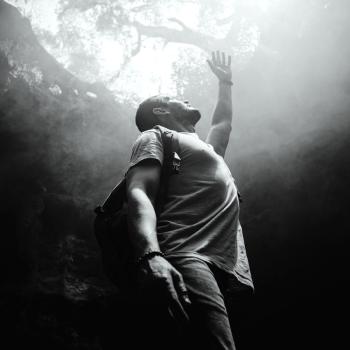Contemplating God
The posts in this column speak, directly or indirectly, about contemplating God. But what is that? And how is it done?
Contemplation is a practice of faith. In some ways not just a practice, but the practice. In fact it is often listed in its own category. The habits of faith–prayer, almsgiving, etc.–have as their goal the contemplation of God.
Again, how? Should I just go sit in a comfortable chair for 20 minutes and imagine the divine?
There are many guides to the how question. The ones most familiar to my readers will likely be Roman Catholics: Ignatius Loyola, Teresa of Avila, Thomas Merton.
I am currently learning from Maximus the Confessor, as you will know if you’ve been reading my column. Maximus was also Catholic, since he lived before the split between east and west. But he was a Greek-writing Byzantine Catholic.
Maximus and the Five Stages
Maximus suggested, in a work with the remarkably inviting title “Difficulty 10,” that contemplating God involves five stages. Being, motion, difference, mixture, and position. Of the five, the first three deal with the thing I’m contemplating, the last two with me, the one doing the contemplating.
Now, his list is, I’m aware, a little more old-world than, say, Merton’s language. That’s because Maximus is old world, reading and reflecting on Aristotle, the Platonic tradition, and early monastic literature. I’ll try to put his stages in terms a bit more new- worldy.
You may already notice that I said “thing contemplated,” which would be an odd way to speak of God. Maximus in fact doesn’t think we begin to know God by thinking about God, but by turning to two equally powerful “things.” The words of scripture and the objects in the world around us. Both get us to the same God, and in this way both are like the incarnate Christ. It’s all material stuff that reveals a hidden Logos within.
Sidebar: Maximus says that we can contemplate a passage of scripture or, for instance, a sunflower, without contemplating the Logos. When we do that, we’re like Potiphar’s wife in Exodus, reaching for Joseph’s body but coming away with an empty tunic. The Logos we were reaching for then runs away naked. I suspect we’ll all remember that image, if nothing else Maximus has to say.
Contemplation: I could move through these five stages with a passage of scripture like Ezekiel 10. I could also try them with my first morning cup of coffee. Let’s try the coffee.

Stage 1: Being
I take a sip, and I ask, how did this coffee come to be? I see emerge the complex, almost mind-numbing, chain of events and causes that brought this particular cup to me. Then I become aware, beyond all of them, of the cause of causes, the God who spoke all into being. God is the cause that transcends all causes, pressuring the world from within to allow this coffee to exist.
Stage 2: Motion
Another sip. What moved God to care for that whole set of events? What do I learn about God, as the cause of the causes of my coffee? This is the question of providence, for Maximus, a topic around which some of his richest theology accrues. Here I contemplate the way my cup of coffee—and the network that brought it to me—reveals the character of the God who loved it into being.
Stage 3: Difference
Another. What is special—different—about this coffee? What notes do I detect? If your pallet is particularly sensitive—mine isn’t—you can taste the signature of this particular roast. How and where was it farmed? What was the roasting technique? This is what Maximus calls judgment. This Creator who brought this coffee to me knows its essence. And that Creator calls it “good.”
Stage 4: Mixture
A fourth sip. What happens in me as I contemplate the cup? I notice affection–one of the four kinds of love–for the familiar taste and smell. But now I notice also a desire for justice for all those creatures, human and otherwise, who have touched it. Maximus says the virtues are getting mixed in with my thoughts about God. I am noticing myself becoming like the affectionate and just God that I set out to know. That’s the process that Maximus calls “theosis.” And sometimes, like this morning, theosis feels good.
Stage 5: Position
A final sip. As I leave the moment with my coffee, I notice that I am attentive to my place as God’s good creature. I am moved to love God by loving what God has made. This coffee has become a tasty little icon to the loving God. And now, thanks to the coffee, so have I.
Perhaps tomorrow I will take up these stages again when I pray. Maybe I will contemplate the being, motion, etc., of one of my children. Or my wife. Or Ezekiel 10.
But this morning, I have loved the God of coffee. And that feels about right.















